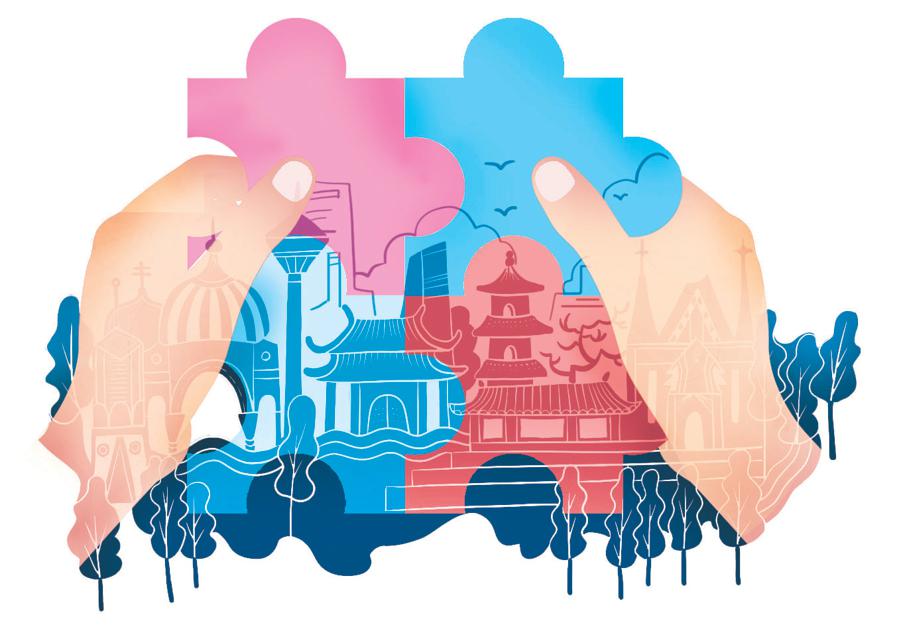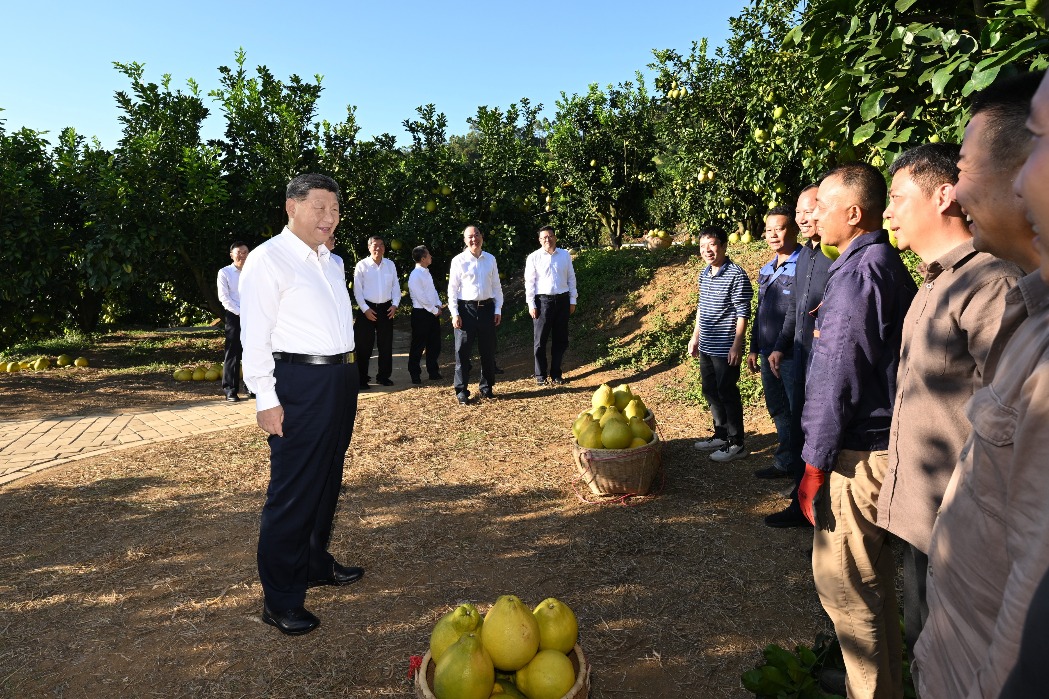Meeting point
Shared common interests should pave the way for the EU and China to find ways to strengthen cooperation in Africa


Shared common interests should pave the way for the EU and China to find ways to strengthen cooperation in Africa
China and the European Union are big players in the development of the African region. Although fundamental differences in their approach to development make large-scale collaboration unlikely, both share common interests in the African region, such as addressing climate change, food security and biodiversity, combatting transnational terrorism and maritime piracy, and managing public health crises, among others.
It is important to maintain arenas for dialogue wherever possible, and focusing on competition in decision-making would be wrong. Excluding competitors will not guarantee the success of policies and prioritizing competition will not benefit African interests.
First, there is no "one-size-fits-all "approach to development. With China's rapid growth and the transformation in its economy and society, Chinese aid — and other investments — have grown dramatically. Its development success has shown that one of the poorest countries can transform into the world's second-largest economy, and eliminate extreme poverty. It can therefore present itself not only as a major source of development finance, but also as an example that rapid growth and transformation is possible.
The EU and European countries should acknowledge that China represents an inspiring alternative to many developing countries, and respect the right of developing countries to make their own choices. In the meantime, it is worth noting that the Western experience is diversified in terms of both development routes and models. The varied experiences of many EU nations present a useful supplement to the often too dominating role of a neo-liberal Anglo-Saxon model. In Nordic countries, for example, the state has played and continues to play a considerably more active role than the neo-liberal textbook indicates.
Second, both sides should see their respective presence in Africa as an opportunity. It is important that European actors acknowledge the positive impact and potential of Chinese development aid. The development model and aid modalities of traditional donors (European countries included) have had some failings. China brings a different approach and can offer interesting lessons. China's development aid has at least four potential advantages, such as being more focused on infrastructure; less bureaucratic with lower transaction costs; more efficient with lower costs; and allowing more policy space (lower conditionality) and increasing the bargaining power of African countries vis-a-vis other donors.
China's infrastructure- and growth-focused approach should not be seen as a threat and instead should be seen as a big complement that can form synergy with European countries. For example, from 2011 to 2020, a sizeable portion of the Official Development Assistance by the Development Assistance Committee donor countries — an average 46 percent — went to social development areas such as education, gender equality, health, and water and sanitation, while only about 20 percent went to infrastructure and manufacturing.
In this regard, China's ability and willingness to offer development finance to Africa provides alternative sources of funding to meet the development needs of African countries, including infrastructure, manufacturing and social development. China-backed African infrastructure projects also improve the operating environment for all parties — including EU firms. Chinese-constructed power plants can make it easier for businesses to operate effectively, and Chinese-built roads and rail lines can get goods to market for all actors in an economy.
Meanwhile, China welcomes Europe's efforts in building local capacity in skilled labor and supporting oversight and judicial institutions and civil society to demand transparency and accountability regarding investments as this also benefits China's interests in the region.
Third, China and the EU can push forward trilateral cooperation. There are growing opportunities for China and the EU and its members to converge on certain issues such as how to help partner countries achieve the United Nations Sustainable Development Goals, as well as share experiences and good practices in evaluating development results and harmonizing standards. For example, proposals for trilateral cooperation have been put forward among the EU, China and African countries through joint business ventures in Africa to promote sustainable development, innovation and institutional capacity building. Working together would allow the EU and China to complement each other and achieve goals they set for themselves that benefit Africa.
Another development in trilateral cooperation has been the inclusion of non-governmental organizations in the implementation of foreign aid projects and a positive message from the Chinese government encouraging NGOs to play a greater role in foreign aid. Trilateral cooperation should focus on areas that are prioritized by both China and other actors, such as renewable and green development, to which China has committed itself and for which the EU has set priorities. Efforts should also be made to foster engagement between European and Chinese research communities, and the private sector to inform the engagement process and provide a basis for stronger official engagement.
The EU and China can also examine how to promote a multilateral system that facilitates such engagement. Both support regional structures such as the African Union, the New Partnership for Africa's Development and the Regional Economic Communities. This creates opportunities for cooperation at the regional level.
Fourth, China and the EU can identify and encourage constructive responses to international and local concerns. China is committed to becoming a major responsible power, which means that China is likely to adopt many of the good practices formed earlier by different partners (also incorporating its own experiences). China's second Africa policy paper has made it clear that it stands with an open mind, ready to strengthen coordination and cooperation with other countries. European countries can show more understanding as different Chinese stakeholders are involved in this process and the process toward high-standards is not linear and takes time.
For example, China is now facing the normal dilemma of a creditor when the borrower faces payment problems. Western creditors have already faced that challenge, and through a very demanding process have developed solutions with varying success. Openly and honestly sharing the lessons learned from these processes could benefit all parties. One obvious answer is a greater emphasis on economic evaluations, and on the operation and maintenance costs that infrastructure investments imply. Open dialogues based on confidence, though challenging in the context of intense global competition, could provide useful lessons and are worth trying to maintain.
The author is the director of the division of general affairs at the China Center for International Knowledge on Development. The author contributed this article to China Watch, a think tank powered by China Daily. The views do not necessarily reflect those of China Daily.
Contact the editor at editor@chinawatch.cn.

































